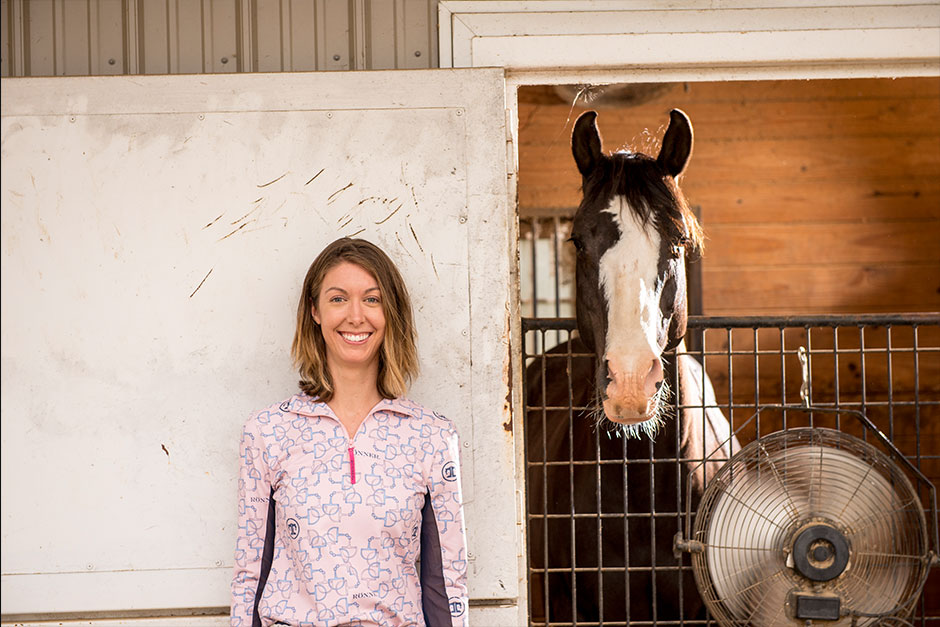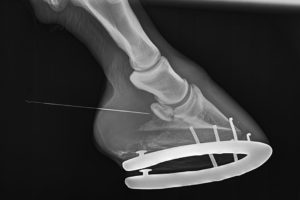If it looks like a duck, swims like a duck, and quacks like a duck, then it probably is a duck! The same could be said in the case of horse gastric ulcers. While I often look for a definite diagnosis to my horse’s ailments, sometimes I have to trust my gut, especially when 100% confirmation of ulcers requires a vet consult, scoping and medication to the tune of $1,000 or more. Owning a horse is expensive, but medication doesn’t always have to be.
After treating Dexter for EPM, something still wasn’t right. His attitude and willingness on the ground and under saddle greatly changed. He began ripping away from the barn manager while walking to field, running out of his stall and even ran out of the barn while I was bridling him in the cross-ties (rest in peace, my PS Of Sweden Get Set Revolution Bridle). This was all out of character for him.
There were also changes to his overall condition. He started losing weight rapidly and didn’t respond to increases in hay or grass. His coat was also dull, despite my daily grooming.
All of these symptoms screamed ulcers.
Desperate to save money, especially after cashing out so much to beat EPM, I leaned on trainers, horse friends and the internet for advice. I was surprised to learn that there were quite a few alternative treatments out there, costing far less than the $35-a-day tubes I see advertised everywhere (what average working equestrian can afford this?!). Granted, the other treatments recommended weren’t FDA-approved, but they all had the same main ingredient: omeprazole.
I should state for the record that I am not a veterinarian nor do I condone treating your horse for ulcers (or any other major medical issue) without your veterinarian’s knowledge. It’s always best to work as a team. In my case, I’m fortunate to have a vet who is willing to let me try different treatment options that work better for my budget.
Here are the two omeprazole treatments I used to treat Dexter’s gastic ulcer symptoms:
Alternative Omeprazole Horse Ulcer Treatments
- AbPrazole. I found AbPrazole™ to be the least expensive Omeprazole treatment at just $2.10 per packet. It comes as flavorless blue coated granules, often called “pop rocks” by others who have used it, in pre-measured packets that are easily dumped into your horse’s feed. While opening the packet can sometimes be tricky without spilling these granules everywhere (best opened with scissors versus ripping across the perforated line), they were not an issue for Dexter to eat. In fact, I don’t even think he noticed them added to his regular feed. The biggest downside to ordering AbPrazole is the shipping–it takes WEEKS to arrive and comes from somewhere in South East Asia.
I’ve also used AbPrazole Plus™ (just $.14 more per packet) at times when Dexter would be on prolonged stall rest or medications as it includes probiotics which are beneficial to gut health.

- Omeprazole/Misoprostol Paste. At $16.99 a tube, Omeprazole/Misoprostol Paste from RaceHorseMeds.com (based in Canada) is quite a bit more costly than AbPrazole, but with an amazing 30% off promo code, I was able to score 35 tubes for $400 (still costing less than half that of Ulcer Guard). I particularly like the format of tubes better than packets as I am able to give them to Dexter on a needed basis. For example, I can dose as a preventative measure before stressful events trailering, hard workouts or days when he can’t be turned out. After giving Dexter one tube of Omeprazole/Misoprostol Paste a day for 45 days, I noticed a 100% change in his look and behavior. It definitely did what it said it would do and then some!

In addition to omeprazole treatments, I became more aware of what could stress Dexter or upset his digestive tract. It’s important to not only treat the issue, but also find solutions for what caused the issue in the first place.




